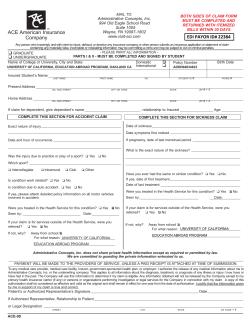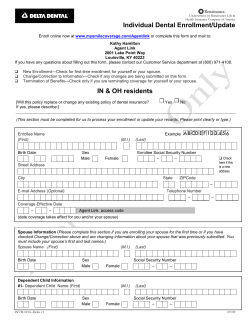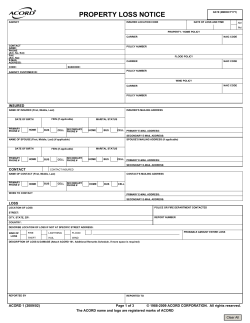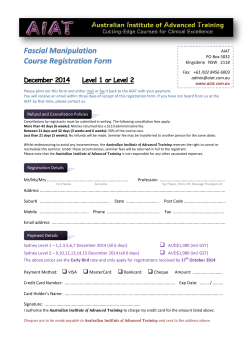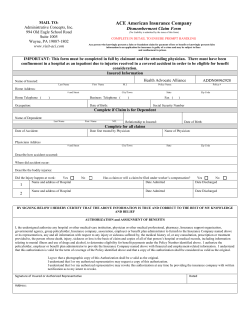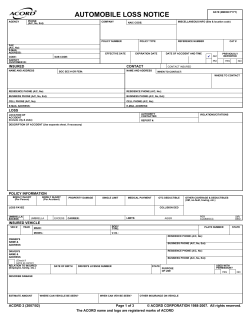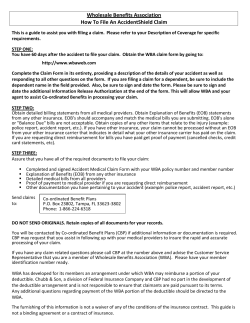
Misleading and Deceptive Conduct under Australian Consumer Law
Comasters Law Firm and Notary Public Misleading and Deceptive Conduct under Australian Consumer Law This article discusses in some detail misleading and deceptive conduct under the Australian Consumer Law. For an overview of the main consumer protections under the Competition and Consumer Laws in Australia, please see our article here: www.comasters.com.au/Comasters_Articles/Competition_and_Consumer_Laws_in_Australia_11.06.01.pdf The Australian Consumer Law (‘ACL’), which forms part of the Competition and Consumer A ct 2010 (Cth) aims to protect consumers and ensure fair trading in Australia. The ACL provides a broad prohibition on misleading and deceptive conduct in trade or commerce. Section 18 of the ACL prohibits a person, in trade or commerce, from engaging conduct that is misleading or deceptive or is likely to mislead or deceive. Although Section 18 appears in the ACL, the section is not limited to consumer transactions or dealings. Many of the cases on misleading and deceptive conduct are business-to-business cases. It is illegal for a business to engage in conduct that misleads or deceives or is likely to mislead or deceive consumers or other businesses. This law applies even if you did not intend to mislead or deceive anyone or no one has suffered any loss or damage as a result of your conduct. A contravention of the prohibition under Section 18 is subject to remedies including injunctions, damages and compensatory orders. WHAT IS “MISLEADING” OR “DECEPTIVE” CONDUCT? The terms “misleading” and “deceptive” are not defined in the ACL and the courts have not given a precise definition of misleading and deceptive conduct. It is the overall impression created by the alleged conduct that determines whether it is likely to lead a significant number of people into error or has the tendency to deceive such persons. The notion of intention is irrelevant in finding misleading and deceptive conduct, what is significant is how the “business conduct” – that is, any statements or actions made by the business - could affect thoughts and beliefs of the consumer. WHAT IS “CONDUCT”? ‘Conduct’ includes actions and statements such as: Advertisements Promotions Quotations Statements Any representation made by a person. Silence can also be regarded as conduct that could be misleading or deceptive. This will, however, depend on the circumstances of each case. Silence can be misleading or deceptive only when: A person fails to alert another to facts known only to them, and the facts are relevant to the decision; Important details a person should know are not conveyed to them; or A change in circumstances where information already provided was incorrect. Promises, opinions and predictions can also be misleading or deceptive if the person making the statement knew it was false, did not care whether it was true or not or had no reasonable grounds for making it. Page 2 of 2 - Misleading and Deceptive Conduct under the Australian Consumer Law WHAT IS “IN TRADE OR COMMERCE”? HOW CAN WE HELP YOU? The misleading and deceptive conduct alleged must Being experienced in the field of Consumer Law, occur in “trade” or “commerce”. The courts have we can help by: interpreted this broadly to cover any kind of commercial activity. However, it is not “in trade or Advising you on your rights and the issues commerce” if it is: relating to misleading and deceptive conduct; and Private one-off sale; Taking actions for breaches and making Internal communications within an claims under Australian Consumer Law. organisation; Regulatory activity by government bodies; © Comasters April 2015. Government information in a non-commercial context; or Political statements. Being “in” trade or commerce means the conduct must be trading or commercial in nature and not merely incidental to trade or commerce. WHAT ARE THE REMEDIES AVAILABLE? Misleading or deceptive conduct may lead to civil remedies provided under Chapter 5 of the ACL. Some examples include: Injunctions: to stop a business fr om engaging in misleading or deceptive conduct, or to require a business to do certain things; Damages: the claimant can apply to the court to get compensation for the loss or damage suffered, or likely to be suffered as a result of the misleading and deceptive conduct of the business; Non-punitive or der s: such as public warning notices against traders who have been given court orders for misleading and deceptive conduct; and Ancillary Orders: which can be or der ed by the Court at its discretion, including but not limited to specific performance, varying the contract or providing repairs. WHAT IS THE TIME LIMIT TO BRING AN ACTION UNDER SECTIOB 18 OF THE AUSTRALIAN CONSUMER LAW? You must bring an action based on misleading and deceptive conduct within six (6) years of the occurrence of the cause of action. Comasters can advise on your rights and obligations under the Australian Consumer Law. We can also advise on claims and possible legal remedies for breaches under the Australian Consumer Law. Important: This is not advice. Clients should not act solely on the basis of the material contained in this paper. Our formal advice should be sought before acting on any aspect of the above information. Comasters Law Firm and Notary Public Suite 101, Level 1, Capitol Terrace 743-755 George Street Sydney NSW 2000, Australia Phone: (612) 9288 0300 Fax: (612) 9288 0399 Email: comasters@comasters.com.au Website: www.comasters.com.au
© Copyright 2025
